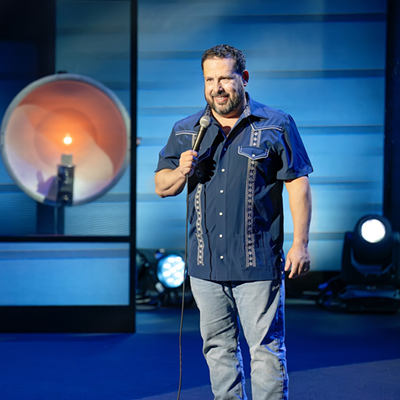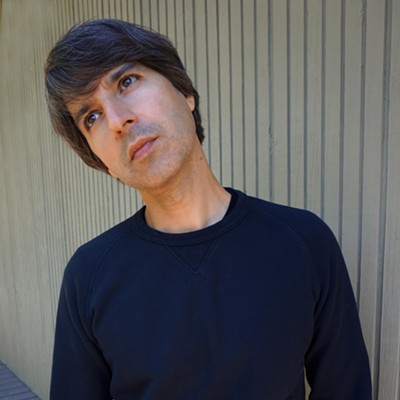"Let's put it this way," he says, speaking by phone from his home in South Dakota, "I graduated 151st out of 170 students, and I'm proud to say it. What I mean by 'loose' is that I don't have a great attention span sometimes, and I like to laugh and joke around and have a good time while working. But a small, independent film on a 20-day schedule for production has to be fast. Fast and funny, put it that way."
Which is also how you could describe interviewing Eyre, whose best-known film, Smoke Signals--the first feature film directed, written by and starring Native Americans that scored both critical and commercial successes--won the Audience Award and the Filmmaker's Trophy at the Sundance Film Festival. With additional projects such as Skins, Doe Boy and Edge of America to his name, he's got the kind of credentials that intimidate perpetually shy interviewers such as myself. But ask the 1991 UA Media Arts department grad what his favorite memories of Tucson are, and he'll come back with, "the weather and Malibu Grand Prix" (an arcade and go-cart track, since closed).
Eyre grew up in Oregon, headed to Tucson for his undergraduate degree ("I got to be a Wildcat in the era of Sean Elliott and all those great athletes," he says), then moved to Manhattan for 10 years, started a production company called Riverhead Entertainment and "actually went through the Sundance Labs, did my masters at NYU, found the money to make Smoke Signals ... and I've been working every since.
"The earliest images I saw of Indian people on screen," he says, "I never thought twice about. Only when I got older and identified more of who I was did I start to understand that all those images had an impact. It's no different that misogynistic movies that involve women--ultimately, they have an impact. I'm not asking for utopia; all I'm saying that we (the Indian community) don't have an alternative because we really don't have the power as indigenous filmmakers or as a smaller group of people to dictate how our image is presented, and that's basically one of my goals--just to present an alternative. I'm not saying no more John Wayne movies--I studied John Ford (director of the John Wayne movies) very heavily at UA ... and it had a deep impact on me--but we have to consider there's no alternative portrayal of Indians in our media."
Eyre's portrayals--particularly of Victor and Thomas from Smoke Signals, who are so likable it almost hurts--stand alone as real, believable human beings, far away from genre and politics and firmly entrenched in their own story ... the trademark of what Loft Cinema director Sande Zeig calls "a perfect film."
I asked Eyre if he feels some satisfaction when he considers the characters he's brought to the screen for a new generation of Native Americans.
"I'm satisfied when I'm working," Eyre laughs, "but when I sit in South Dakota for too long, I start to get bored. I just really love working. I tell young Native people all the time--and some of them look at me with dismay, like they haven't heard it said before--you have to do something you love. If you're going to school to get a degree because you think it assures you some financial future. ... I would say that's not the key to your happiness and livelihood. I tell Indian kids to make sure they do what they want to do. It's no epiphany; it's just something that you should always consider.
"Especially in this administration," he adds; "it's no secret. We put so much credence into athletics, and at the same time, they're taking away music and arts programs and the whole creative aspect of people expressing themselves. When I think of young people having arts and music taken away--that's a huge tragedy. ... That's a vital, vital part of our health."
But Eyre does see a vibrant, if small, community of Native filmmakers (though not commercial filmmakers), actors, musicians and artists--"it's really a one-degree of separation type thing," he says, "and that's nice. There's a great sense of comradery and togetherness ... the exciting thing is this Renaissance of Native socializing and culture that goes on through spots of economic prosperity; not all over Indian Country, but certainly there are more interesting events within certain tribes that have the capital now."
Eyre's latest film, Edge of America, is based on the true story of an African American teacher who travels to the Three Nations Reservation to teach English, then agrees to coach a lackluster girl's basketball team as a way to gain acceptance in the tight-knit community.
"One of the interesting things about this film," says Eyre, "is that it is a movie where both protagonists are ethnic minorities. It doesn't have the bridge of a white protagonist to make the story relevant for the audience. The protagonist in this movie is a black gentleman who goes to the reservation to teach at the high school, and inherits this sort of Bad News Bears girls' basketball team. When I started working with the writer, the most important thing for me was that it seemed ridiculous for an outsider to come in and teach people on the reservation more than they themselves would receive from the community. In a Hollywood movie, it would have been an outsider coming in and showing them a better way. This is the converse of that. Sure, he can teach them basketball, but ultimately, any one person who is engulfed in another culture is going to learn more about that culture--and therefore themselves--than they would ever be able to give. That's why this is an anti-Hollywood movie."
Edge of America will screen at 7 p.m. Thursday, Nov. 4 at The Loft Cinema, 3233 E. Speedway Blvd., 795-7777. Admission is free (suggested $10 donation to the nonprofit Tucson Cinema Foundation); a Q&A and reception with Chris Eyre will follow the screening.







